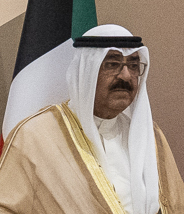Political deadlock seen persisting after first Kuwait poll under new emir
Kuwait's first parliamentary election under the new Emir Sheikh Meshal al-Ahmad al-Sabah has resulted in few changes, indicating that ongoing tensions between government and lawmakers that have paralysed decision-making are likely to persist. The results of Thursday's poll showed only 11 new members of parliament, out of a total of 50 elected MPs in the Gulf Arab state.

- Country:
- Kuwait
Kuwait's first parliamentary election under the new Emir Sheikh Meshal al-Ahmad al-Sabah has resulted in few changes, indicating that ongoing tensions between government and lawmakers that have paralyzed decision-making are likely to persist.
The results of Thursday's poll showed only 11 new members of parliament, out of a total of 50 elected MPs in the Gulf Arab state. The new emir is keen to push through economic reforms after a protracted deadlock between appointed governments and elected parliaments hindered progress.
Sheikh Meshal's reform-minded approach, with scant tolerance for political bickering, appears aimed at helping the OPEC producer to catch up with Gulf neighbours which have been implementing ambitious plans to wean their economies off oil. He strongly criticized the last National Assembly and the government in his first speech before parliament after taking office in December, saying they were "harming the interests of the country and its people".
The government of Sheikh Ahmed Al-Nawaf resigned hours after the speech. Sheikh Muhammad Sabah Al-Salem Al-Sabah formed a new government that included new ministers of oil, finance, foreign affairs, interior, and defence. Sheikh Meshal, 83, succeeded his late brother Sheikh Nawaf Al-Ahmad in December and dissolved parliament on Feb. 15, less than two months into his tenure.
His decree cited the assembly's "violation of the constitutional principles" as a reason for dissolution. FREQUENT ELECTIONS
Kuwait bans political parties, and candidates run for election as individuals despite their political affiliations. Its legislature has more influence than similar bodies in other Gulf monarchies, including the power to pass and block laws, question ministers, and submit no-confidence motions. Political deadlock, however, has led to endless cabinet reshuffles and dissolutions of parliament, paralyzing policy-making, but the Emir holds the upper hand.
Thursday's election was the fourth since Dec. 2020. Frequent elections limit voters' ability to monitor parliamentarians and result in re-selecting the same candidates, political analyst Saleh al-Saeedi told Reuters.
Successive votes "diminish the rate of change and offer less room for new faces to emerge", he said. Results on Friday showed a single female candidate was elected, the same as in the previous parliament, while Shi'ite Muslim lawmakers secured eight seats in the predominantly Sunni Muslim Gulf Arab state, one more than last year.
Seats for the Islamic Constitutional Movement, which represents the Kuwaiti branch of the Muslim Brotherhood, fell to one from the previous three.
(This story has not been edited by Devdiscourse staff and is auto-generated from a syndicated feed.)










